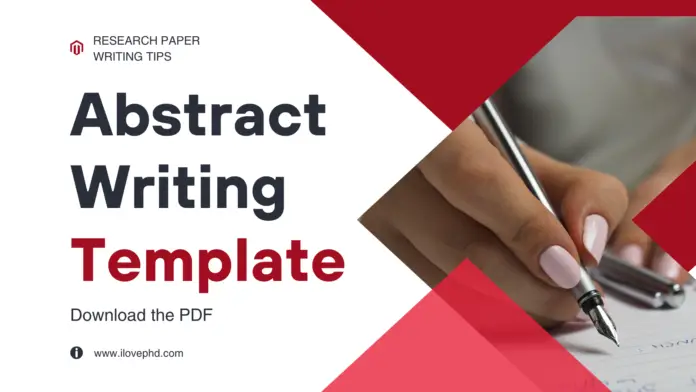When it comes to writing a research paper, one of the most important parts is the abstract. An abstract is a concise summary of the main points of your research, and it’s typically the first thing that readers will see. Therefore, it’s essential to make sure that your abstract is well-written and informative.
To help you write an effective abstract, we’ve put together a template that you can use as a guide. This template will ensure that you include all the necessary information in your abstract and that you present it in a clear and organized manner.
Writing an Effective Abstract for Your Research Paper: Tips and Format
Here’s the template:
- Background: Start by providing some context for your research. This could include a brief overview of the problem you’re trying to solve or the question you’re trying to answer.
- Objectives: Next, state the objectives of your research. What did you hope to accomplish with your study?
- Methods: Describe the methods you used to conduct your research. This should include information on the participants, materials, and procedures.
- Results: Present the results of your research. What did you find? Be sure to include any statistical analyses that you performed.
- Conclusions: Finally, conclude your abstract with a summary of your main findings and their implications. What are the broader implications of your research? What are the next steps that need to be taken?
Abstract Template for Research Paper
here is an example of an abstract format with the recommended number of words and some tips:
Title: [Insert the title of your research paper here]
Abstract:
[The abstract should be a concise summary of your research paper. It should be written in one paragraph and should not exceed 150 to 250 words. Here is a possible format you can use:]
- Background: [1-2 sentences] Provide some context for your research. Explain why this topic is important and what gap in the literature you are trying to address.
- Objectives: [1-2 sentences] State the objectives of your research. What did you hope to accomplish with your study? What research questions did you try to answer?
- Methods: [2-3 sentences] Describe the methods you used to conduct your research. This should include information on the participants, materials, and procedures. Be specific and concise.
- Results: [2-3 sentences] Present the results of your research. What did you find? Highlight the key findings of your study and explain their significance.
- Conclusions: [1-2 sentences] Finally, conclude your abstract with a summary of your main findings and their implications. What are the broader implications of your research? What are the next steps that need to be taken?
Download the PDF to Write an Abstract for Your Research Paper
Tips to Write an impressive abstract
- Use clear and concise language. Avoid using technical terms or jargon that may be unfamiliar to readers.
- Focus on the key findings and their implications, rather than providing a detailed description of every aspect of your study.
- Make sure to proofread your abstract carefully to ensure it is free of errors and typos.
- Use active voice and present tense to make the abstract more engaging and dynamic.
- Avoid using abbreviations or acronyms unless they are widely recognized in your field.
Keywords Should be Avoided while Writing Abstract
When writing your abstract, it’s important to keep in mind that it should be concise and to the point. Aim for a length of around 150-250 words, and avoid including unnecessary details or jargon. You want your abstract to be easy to understand for readers who may not be familiar with your specific field of study.
In addition to following the template above, there are a few other tips you should keep in mind when writing your abstract. First, make sure to use clear and concise language. Avoid using overly technical terms or jargon that may be unfamiliar to readers.
Second, be sure to highlight the most important aspects of your research. Focus on the key findings and their implications, rather than providing a detailed description of every aspect of your study.
Finally, proofread your abstract carefully to ensure it is free of errors and typos. A well-written and error-free abstract will help to make a good first impression on readers and increase the chances that they will continue reading your paper.
In conclusion, writing an abstract for a research paper is an important task that requires careful attention to detail. Following the template and tips outlined above, you can create a clear and informative abstract to engage readers and draw them into your research.
Also Read: How to Create Graphical Abstract

